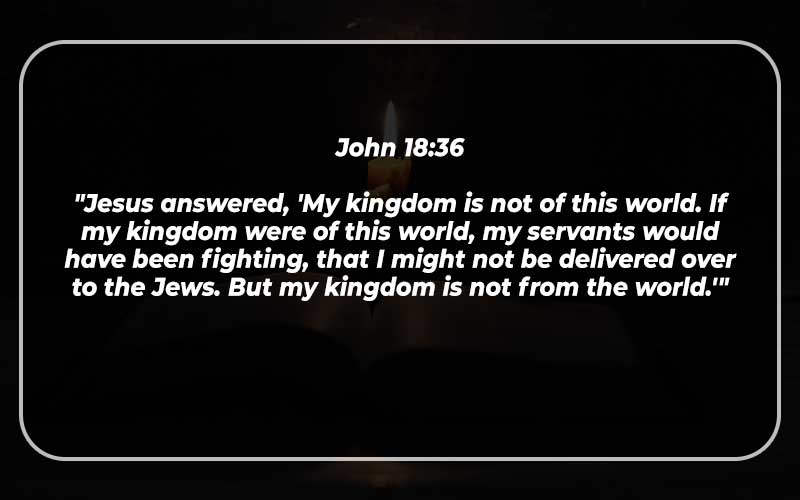The Gospel of John, the fourth book of the New Testament, is a profound and spiritually rich account of the life, teachings, death, and resurrection of Jesus Christ.
Believed to be written by the apostle John, this Gospel stands out for its unique perspective, emphasizing the divinity of Jesus and the importance of faith in Him for eternal life.
The verses from the Gospel of John offer deep insights into the nature of God, the person of Jesus, and the transformative power of belief. In the following commentary, we explore 30 selected verses from the Gospel of John.
John Bible Verses
John 1:1
“In the beginning was the Word, and the Word was with God, and the Word was God.”
This verse establishes the divine nature of Jesus, referring to Him as the Word that existed from the very beginning, coexistent with God. It lays the foundation for understanding Jesus as the embodiment of God’s communication and revelation.
John 1:14
“And the Word became flesh and dwelt among us, and we have seen his glory, glory as of the only Son from the Father, full of grace and truth.”
Here, John declares the incarnation of the Word in Jesus Christ. The divine Word took on human form, revealing God’s glory and embodying both grace and truth. This verse encapsulates the essence of Christmas—the divine becoming human.
John 3:16
“For God so loved the world, that he gave his only Son, that whoever believes in him should not perish but have eternal life.”
Arguably the most famous verse in the Bible, it encapsulates the core of the Gospel message. God’s love is expressed through the sacrificial gift of His Son, providing a pathway to eternal life for those who believe.
John 4:24
“God is spirit, and those who worship him must worship in spirit and truth.”
Jesus emphasizes the spiritual nature of true worship. It goes beyond external rituals, requiring a sincere and truthful connection between the worshiper and the divine.
John 6:35
“Jesus said to them, ‘I am the bread of life; whoever comes to me shall not hunger, and whoever believes in me shall never thirst.'”
Jesus, the Bread of Life, satisfies the deepest spiritual hunger and thirst. This metaphorical language speaks to the profound fulfillment found in a relationship with Christ.
John 8:12
“Again Jesus spoke to them, saying, ‘I am the light of the world. Whoever follows me will not walk in darkness but will have the light of life.'”
Jesus, the Light of the World, dispels spiritual darkness. Following Him brings illumination, guidance, and the assurance of eternal life.
John 10:10
“The thief comes only to steal and kill and destroy. I came that they may have life and have it abundantly.”
In contrast to the destructive forces, Jesus promises abundant life. His mission is to bring a full, meaningful, and flourishing existence to those who follow Him.
John 11:25-26
“Jesus said to her, ‘I am the resurrection and the life. Whoever believes in me, though he die, yet shall he live, and everyone who lives and believes in me shall never die.'”
This powerful declaration underscores Jesus’ authority over life and death. Believers find hope in the promise of resurrection and eternal life through faith in Him.
John 13:34-35
“A new commandment I give to you, that you love one another: just as I have loved you, you also are to love one another. By this, all people will know that you are my disciples, if you have love for one another.”
Jesus introduces a revolutionary commandment—loving others as He loved. The authenticity of discipleship is revealed through selfless, Christ-like love.
John 14:6
“Jesus said to him, ‘I am the way, and the truth, and the life. No one comes to the Father except through me.'”
This verse expresses the exclusivity of salvation through Jesus. He is the only path to God, the ultimate truth, and the source of eternal life.
John 15:5
“I am the vine; you are the branches. Whoever abides in me and I in him, he it is that bears much fruit, for apart from me you can do nothing.”
The metaphor of the vine and branches emphasizes the intimate connection between believers and Jesus. True productivity and spiritual vitality come from staying connected to Him.
John 16:33
“I have said these things to you, that in me you may have peace. In the world, you will have tribulation. But take heart; I have overcome the world.”
Jesus acknowledges the challenges of life but assures believers of His victorious power, providing a profound peace that transcends worldly difficulties.
John 17:3
“And this is eternal life, that they know you, the only true God, and Jesus Christ whom you have sent.”
Jesus defines eternal life as a relational knowledge of God and Himself. It’s not just a duration but a quality of intimate connection with the divine.
John 18:36
“Jesus answered, ‘My kingdom is not of this world. If my kingdom were of this world, my servants would have been fighting, that I might not be delivered over to the Jews. But my kingdom is not from the world.'”
Jesus clarifies the spiritual nature of His kingdom, distinct from earthly kingdoms. His mission is to establish a kingdom that transcends worldly power dynamics.

John 19:30
“When Jesus had received the sour wine, he said, ‘It is finished,’ and he bowed his head and gave up his spirit.”
These words mark the completion of Jesus’ redemptive work on the cross. The sacrifice for sin is accomplished, and salvation is made available to all who believe.
John 20:29
“Jesus said to him, ‘Have you believed because you have seen me? Blessed are those who have not seen and yet have believed.'”
Jesus acknowledges the faith of those who believe without seeing. Faith is a blessed journey of trust, and it is rewarded by a deep and meaningful relationship with Christ.
John 21:15
“When they had finished breakfast, Jesus said to Simon Peter, ‘Simon, son of John, do you love me more than these?’ He said to him, ‘Yes, Lord; you know that I love you.’ He said to him, ‘Feed my lambs.'”
This interaction highlights the restoration of Peter and emphasizes the responsibility of love—expressed in caring for others—as a response to one’s love for Christ.
John 6:51
“I am the living bread that came down from heaven. If anyone eats of this bread, he will live forever. And the bread that I will give for the life of the world is my flesh.”
Jesus extends the metaphor of Himself as the bread of life, emphasizing the necessity of partaking in Him for eternal life. His sacrificial death on the cross is the means by which believers receive this spiritual sustenance.
John 8:32
“And you will know the truth, and the truth will set you free.”
Jesus underscores the liberating power of truth. In Him, believers find not only truth but freedom—freedom from sin, guilt, and the bondage of falsehood.
John 10:11
“I am the good shepherd. The good shepherd lays down his life for the sheep.”
Jesus portrays Himself as the caring and sacrificial shepherd, contrasting with the hired hand who abandons the flock. This imagery highlights His deep love and commitment to His followers.
John 14:16-17
“And I will ask the Father, and he will give you another Helper, to be with you forever, even the Spirit of truth, whom the world cannot receive because it neither sees him nor knows him. You know him, for he dwells with you and will be in you.”
Jesus promises the coming of the Holy Spirit, the Helper, who will guide and empower believers. This divine presence ensures a continuous connection between God and His people.
John 15:13
“Greater love has no one than this, that someone lay down his life for his friends.”
Jesus epitomizes the highest form of love—self-sacrifice. His death on the cross is the ultimate expression of love, demonstrating the depth of God’s care for humanity.
John 16:7
“Nevertheless, I tell you the truth: it is to your advantage that I go away, for if I do not go away, the Helper will not come to you. But if I go, I will send him to you.”
Jesus explains the necessity of His departure, as it paves the way for the Holy Spirit to indwell believers. The Spirit brings guidance, comfort, and empowerment.
John 17:17
“Sanctify them in the truth; your word is truth.”
In His prayer, Jesus emphasizes the sanctifying power of truth found in God’s Word. The Scriptures play a crucial role in the spiritual growth and transformation of believers.
John 20:21
“Jesus said to them again, ‘Peace be with you. As the Father has sent me, even so, I am sending you.'”
After His resurrection, Jesus commissions His disciples to continue His mission. This verse underscores the call for believers to actively participate in sharing the message of salvation and embodying the love of Christ.
John 3:3
“Jesus answered him, ‘Truly, truly, I say to you, unless one is born again he cannot see the kingdom of God.'”
Jesus introduces the concept of spiritual rebirth, emphasizing the necessity of a transformative experience for entering into God’s kingdom.
John 5:24
“Truly, truly, I say to you, whoever hears my word and believes him who sent me has eternal life. He does not come into judgment but has passed from death to life.”
Jesus assures believers of their security in Him. Through faith in His word and the Father, they not only gain eternal life but also escape the judgment of sin.
John 14:21
“Whoever has my commandments and keeps them, he it is who loves me. And he who loves me will be loved by my Father, and I will love him and manifest myself to him.”
Love for Jesus is expressed through obedience to His commands. The result is a profound experience of God’s love and a tangible manifestation of Christ in the believer’s life.
John 15:16
“You did not choose me, but I chose you and appointed you that you should go and bear fruit and that your fruit should abide, so that whatever you ask the Father in my name, he may give it to you.”
Jesus emphasizes the divine initiative in salvation and the purpose of bearing lasting fruit. Believers are chosen, appointed, and empowered for a mission that brings glory to God.
John 21:22
“Jesus said to him, ‘If it is my will that he remain until I come, what is that to you? You follow me!'”
In response to Peter’s curiosity about another disciple’s fate, Jesus redirects the focus to personal commitment. This verse emphasizes the importance of individual obedience and following Jesus, irrespective of others’ journeys.

